中英文对照-中国历史简介
- 格式:docx
- 大小:14.27 KB
- 文档页数:6
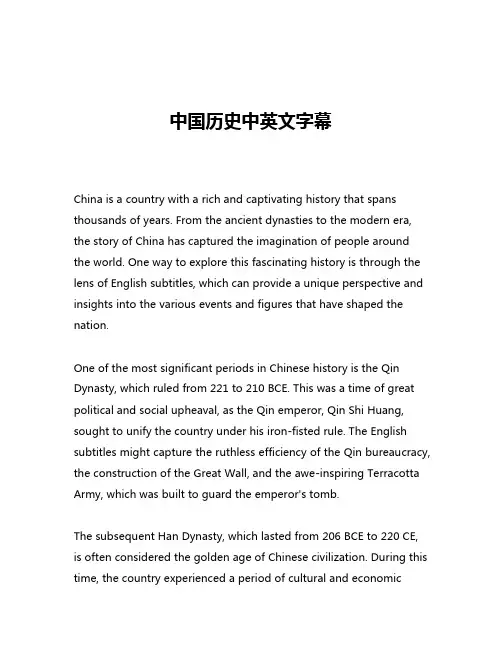
中国历史中英文字幕China is a country with a rich and captivating history that spans thousands of years. From the ancient dynasties to the modern era, the story of China has captured the imagination of people around the world. One way to explore this fascinating history is through the lens of English subtitles, which can provide a unique perspective and insights into the various events and figures that have shaped the nation.One of the most significant periods in Chinese history is the Qin Dynasty, which ruled from 221 to 210 BCE. This was a time of great political and social upheaval, as the Qin emperor, Qin Shi Huang, sought to unify the country under his iron-fisted rule. The English subtitles might capture the ruthless efficiency of the Qin bureaucracy, the construction of the Great Wall, and the awe-inspiring Terracotta Army, which was built to guard the emperor's tomb.The subsequent Han Dynasty, which lasted from 206 BCE to 220 CE, is often considered the golden age of Chinese civilization. During this time, the country experienced a period of cultural and economicprosperity, with the development of advanced agricultural techniques, the expansion of trade routes, and the flourishing of art and literature. The English subtitles might highlight the contributions of Han scholars and philosophers, such as the renowned Confucian thinker, Han Yu, who advocated for a return to traditional values in the face of political and social change.The Tang Dynasty, which ruled from 618 to 907 CE, is often regarded as the pinnacle of Chinese cultural achievement. This era saw the rise of the capital city of Chang'an, which was one of the largest and most cosmopolitan cities in the world at the time. The English subtitles might capture the grandeur of the Tang court, the influence of Buddhism, and the vibrant literary and artistic traditions that flourished during this period.The Song Dynasty, which followed the Tang, is often remembered for its technological and scientific advancements. During this time, the Chinese developed innovations such as gunpowder, the compass, and the printing press, which would have far-reaching global consequences. The English subtitles might highlight the contributions of Song scholars and inventors, as well as the complex political and social dynamics that shaped this era.The Ming Dynasty, which ruled from 1368 to 1644, is often associated with the construction of the Forbidden City in Beijing andthe voyages of the legendary explorer, Zheng He. The English subtitles might capture the splendor of the Ming court, the expansion of Chinese influence throughout Asia, and the cultural and artistic achievements that defined this period.The Qing Dynasty, which succeeded the Ming, is often seen as the last great imperial dynasty of China. This era was marked by the expansion of the Chinese empire, the development of a sophisticated bureaucratic system, and the flourishing of Manchu culture. The English subtitles might explore the complexities of the Qing's interactions with the West, the Opium Wars, and the eventual decline of the dynasty in the face of internal and external pressures.Finally, the modern era of Chinese history has been shaped by a series of dramatic events, from the Xinhai Revolution and the establishment of the Republic of China, to the rise of the Communist Party and the founding of the People's Republic of China. The English subtitles might capture the struggles and triumphs of this tumultuous period, as China has sought to redefine its place in the world and overcome the challenges of the 20th century.Throughout these various eras, the English subtitles can provide a unique window into the rich tapestry of Chinese history. By highlighting the key events, figures, and cultural achievements that have defined the country, these subtitles can help to bridge the gapbetween the East and the West, fostering a greater understanding and appreciation of this ancient and dynamic civilization.。
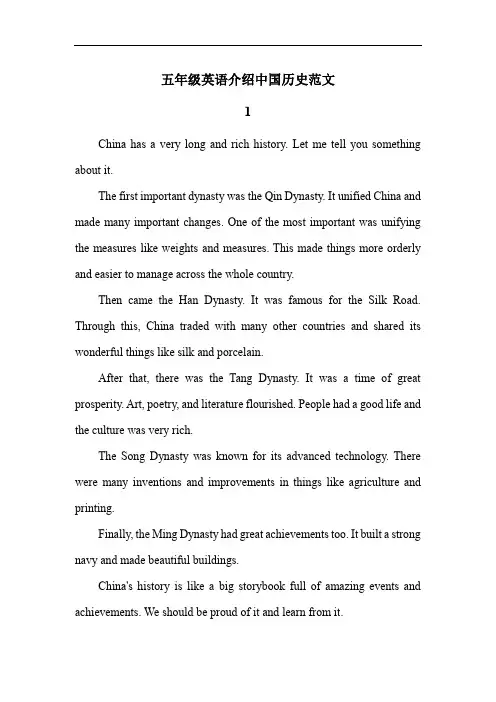
五年级英语介绍中国历史范文1China has a very long and rich history. Let me tell you something about it.The first important dynasty was the Qin Dynasty. It unified China and made many important changes. One of the most important was unifying the measures like weights and measures. This made things more orderly and easier to manage across the whole country.Then came the Han Dynasty. It was famous for the Silk Road. Through this, China traded with many other countries and shared its wonderful things like silk and porcelain.After that, there was the Tang Dynasty. It was a time of great prosperity. Art, poetry, and literature flourished. People had a good life and the culture was very rich.The Song Dynasty was known for its advanced technology. There were many inventions and improvements in things like agriculture and printing.Finally, the Ming Dynasty had great achievements too. It built a strong navy and made beautiful buildings.China's history is like a big storybook full of amazing events and achievements. We should be proud of it and learn from it.2China has a long and wonderful history that is full of amazing stories and great people. Let me tell you about some of them.The first person we should know is Emperor Qin Shi Huang. He was like a powerful lion who unified the seven warring states and built the Great Wall. This great wall is like a huge dragon lying on the land, protecting the people.Then there was Emperor Wu of Han. He was as wise as an owl. He expanded the territory of China and made it stronger. He also promoted culture and education, making people's lives better.These great emperors and their achievements are like bright stars in the sky of Chinese history. They show us how people in the past worked hard and made great things happen.Learning about Chinese history is like opening a treasure chest. There are so many wonderful and exciting stories waiting for us to discover. I hope you will all be interested in this amazing part of our country's past and keep exploring it.3China has a long and splendid history that is full of remarkable achievements and innovations. For fifth-grade students, understanding China's historical development is very important.In ancient times, China made many great inventions that had a huge impact on the world. One of the most significant was papermaking. Before its invention, people had to write on heavy materials like bamboo or silk. But with paper, it became much easier to record and spread knowledge.Another amazing invention was printing. The technique of printing allowed books to be produced in large quantities, making knowledge accessible to more people.These inventions not only changed the way people lived and learned in China but also had a profound influence on the rest of the world. They helped to promote cultural exchange and the development of human civilization.Throughout history, China has also experienced many dynasties, each with its own unique characteristics and contributions. From the Qin Dynasty to the Tang Dynasty and beyond, Chinese culture, art, and science continued to evolve and thrive.In conclusion, China's history is a treasure trove of wisdom and creativity. By learning about it, we can better appreciate the achievements of our ancestors and be inspired to create a brighter future.4China has a long and glorious history full of remarkable achievements and wonders. Let's take a look at some key points that fifth graders should remember.One of the most famous inventions in ancient China was paper. It made it possible for people to record and share knowledge easily. Another great invention was gunpowder, which was used in warfare and for celebrations. The compass helped sailors navigate and explore new lands. Printing, especially movable type printing, made books more accessible.The Great Wall of China is a magnificent structure. It was built over many years to protect the country from invaders. It is a symbol of the hard work and determination of the Chinese people.These are just a few highlights of China's rich history. Remembering them helps us understand our past and appreciate the efforts of our ancestors. By knowing these, we can feel proud of our country's achievements and look forward to creating more wonderful things in the future.5China has a long and wonderful history that is full of amazing stories and legends. Let me tell you some of them!One of the most famous legends is about Nüwa. It is said that the sky was broken and Nüwa used stones of five colors to mend it. She was so brave and kind!Another exciting story is about Houyi. The suns were too hot and made people's lives very difficult. Houyi was a great hero who shot down nine of the suns and saved everyone.There are many more tales like these that show how brave and smart the people in ancient China were. They faced difficulties and found ways to solve them.Learning about Chinese history is like opening a big box of treasures. You can find so many interesting things that make you want to know more and more. So, dear friends, let's explore the wonderful world of Chinese history together and have a great adventure!。
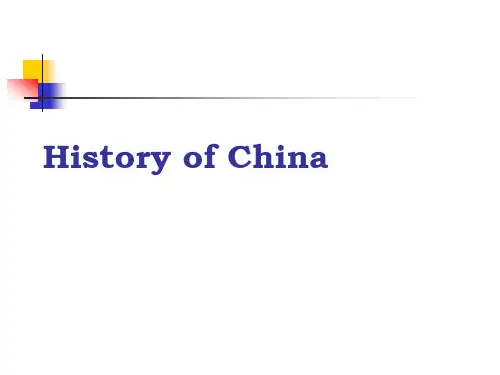

China's Historical Overview in English(16 Pages)Page 1: Ancient China (Prehistoric Era to Qin Dynasty)The history of China stretches back over 5,000 years, beginning with the prehistoric era when early humansinhabited the region. The Xia Dynasty, though largely mythical, is often considered the first dynasty of China. The Shang Dynasty, which followed, left behind the earliest written records and a rich collection of bronze artifacts. The Zhou Dynasty saw the development of Confucianism and Taoism, two of the major philosophical systems that would shape Chinese culture.Page 2: The Spring and Autumn Period and the Warring States PeriodThe Spring and Autumn Period, named after the chronicle "The Spring and Autumn Annals," was a time of rapid social and political change. This era was marked the decline of the Zhou Dynasty and the rise of several states vying for power. The subsequent Warring States Period was a period of intense warfare and philosophical development, including the birth of Legalism.Page 3: The Qin Dynasty (221206 BC)The Qin Dynasty, though shortlived, was pivotal in Chinese history. Qin Shi Huang, the first emperor of aunified China, standardized the writing system, currency, and measurements. He also began construction of the Great Wall and the Terracotta Army, which continues to astound visitors today.Page 4: The Han Dynasty (206 BC AD 220)The Han Dynasty is often cited as one of the golden ages of Chinese history. It saw the expansion of the Silk Road, which facilitated trade and cultural exchange with the West. The Han Dynasty also saw the development of Buddhism in China and the establishment of a civil service system based on merit.Page 5: The Three Kingdoms, Jin Dynasty, and the Southern and Northern DynastiesThe Three Kingdoms period, romanticized in the historical novel "Romance of the Three Kingdoms," was a time of fragmentation and warfare following the fall of the Han Dynasty. The Jin Dynasty reunified the north, but the country soon split again into the Southern and Northern Dynasties, leading to a period of cultural diversity and technological innovation.Page 6: The Sui Dynasty (581618)The Sui Dynasty, though shortlived, managed to reunify China. It is known for the construction of the Grand Canal, which linked the Yellow River and the Yangtze River, facilitating trade and transportation across the vast territory.Page 7: The Tang Dynasty (618907)The Tang Dynasty is renowned for its cultural achievements and economic prosperity. It is often referred to as the "Age of Unity andProsperity." The Tang Dynasty saw the flourishing of poetry, with poets like Li Bai and Du Fu, and the expansion of foreign trade along the Silk Road.Page 8: The Five Dynasties and Ten Kingdoms Period (907960)The Five Dynasties and Ten Kingdoms period was a time of political fragmentation. Despite the lack of a central authority, this era saw the continuation of cultural and economic developments, particularly in the south.(To be continued)Page 9: The Song Dynasty (9601279)The Song Dynasty is celebrated for its economicrevolution and cultural advancements. The era saw the early development of a market economy, the introduction of paper money, and remarkable innovations in agriculture and technology. The Song Dynasty also nurtured a flourishing ofthe arts, with landscape painting reaching new heights andthe philosophical school of NeoConfucianism gaining prominence.Page 10: The Yuan Dynasty (12711368)Established the Mongolian leader Kublai Khan, the Yuan Dynasty marked the first time that all of China was ruled nonHan Chinese. The Yuan Dynasty is notable for its patronage of the arts and its administrative organization, whichincluded the establishment of the Yuan Shikai, a precursor to modernday postal systems.Page 11: The Ming Dynasty (13681644)The Ming Dynasty is renowned for its maritime expeditions, notably those led the explorer Zheng He, which reached asfar as Africa and the Middle East. The dynasty is also famous for its architectural achievements, including theconstruction of the Forbidden City and the reinforcement ofthe Great Wall. The Ming era saw a flourishing of literature and drama, with the latter exemplified the works of Tang Xianzu.Page 12: The Qing Dynasty (16441912)The Qing Dynasty, established the Manchu people, was the last imperial dynasty of China. It reached its territorial zenith under Emperors Kangxi and Qianlong, expanding China's borders to include Tibet, Xinjiang, and Mongolia. However,the latter part of the dynasty was marked internal strife, foreign invasions, and the humiliating Boxer Protocol, leading to the decline of imperial power.Page 13: The Xinhai Revolution and the Republic of China The Xinhai Revolution of 1911 led to the overthrow of the Qing Dynasty and the establishment of the Republic of China under the leadership of Sun Yatsen. The early years of the republic were tumultuous, with warlordism and the strugglefor power between the Nationalist Party (Kuomintang) and the Communist Party.Page 14: The Chinese Civil War and the Establishment of the People's Republic of ChinaThe Chinese Civil War, which began in the late 1920s and ended in 1949, resulted in the victory of the Communist Party and the establishment of the People's Republic of China Mao Zedong. The new regime implemented sweeping land reforms and began the process of collectivization, which would have profound effects on Chinese society.Page 15: The Cultural Revolution and its AftermathThe Cultural Revolution, initiated Mao Zedong in 1966, was a radical sociopolitical movement aimed at purging remnants of capitalist and traditional elements from Chinese society. It led to widespread violence and the destruction of historical artifacts. The period following the CulturalRevolution was marked a shift towards economic reform and opening up to the world.Page 16: Modern China and the Path to the FuturePage 17: The Reform and Openingup PolicyDeng Xiaoping's leadership in the late 1970s brought about the Reform and Openingup Policy, which transformed China's economy from a centrally planned system to a market economy. This policy allowed foreign investment, established special economic zones, and encouraged private enterprise. The result was an economic boom that lifted hundreds of millions out of poverty and turned China into a global manufacturing hub.Page 18: The Rise of China's Tech GiantsPage 19: China's Space ExplorationChina's space program has made significant strides, including the successful launch of the Shenzhou spacecraft series and the construction of the Tiangong Space Station. In 2020, China became the second country to land a rover on the far side of the moon, demonstrating its ambition and capability in space exploration.Page 20: Environmental Challenges and Green InitiativesPage 21: Belt and Road InitiativeAnnounced in 2013, the Belt and Road Initiative is a global development strategy aimed at enhancing regionalconnectivity and economic integration. It involves infrastructure development and investments in countries across Asia, Europe, and Africa. The initiative reflects China's desire to take a more active role in global affairs and to expand its influence.Page 22: China's Role in Global DiplomacyChina has increasingly engaged in global diplomacy, playing a key role in international organizations such as the United Nations. It has also established strategic partnerships with countries around the world. However,China's assertiveness in regional disputes, particularly in the South China Sea, has raised concerns about its geopolitical intentions.Page 23: The Pursuit of Soft PowerRecognizing the importance of soft power, China has been promoting its culture and language through initiatives like the establishment of Confucius Institutes worldwide. These institutes offer Chinese language and cultural courses, contributing to the global spread of Chinese language and culture.Page 24: ConclusionChina's history is a tapestry of dynasties, revolutions, and rapid modernization. From the ancient dynasties that laid the foundation for Chinese civilization to the modern era oftechnological advancement and global engagement, China's story is one of resilience, innovation, and transformation. As China continues to evolve, its historical narrative will no doubt continue to influence its role on the world stage.。
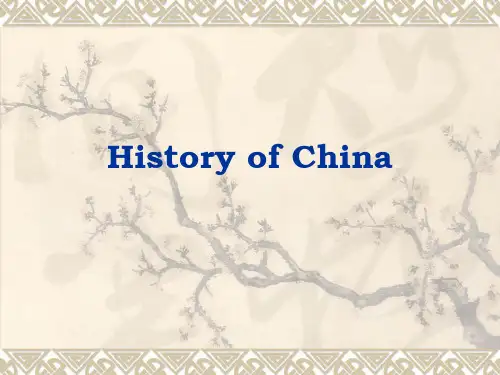
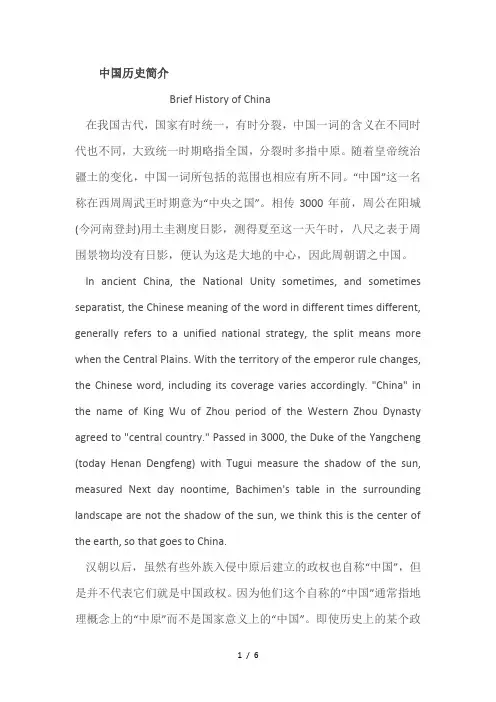
中国历史简介Brief History of China在我国古代,国家有时统一,有时分裂,中国一词的含义在不同时代也不同,大致统一时期略指全国,分裂时多指中原。
随着皇帝统治疆土的变化,中国一词所包括的范围也相应有所不同。
“中国”这一名称在西周周武王时期意为“中央之国”。
相传3000年前,周公在阳城(今河南登封)用土圭测度日影,测得夏至这一天午时,八尺之表于周围景物均没有日影,便认为这是大地的中心,因此周朝谓之中国。
In ancient China, the National Unity sometimes, and sometimes separatist, the Chinese meaning of the word in different times different, generally refers to a unified national strategy, the split means more when the Central Plains. With the territory of the emperor rule changes, the Chinese word, including its coverage varies accordingly. "China" in the name of King Wu of Zhou period of the Western Zhou Dynasty agreed to "central country." Passed in 3000, the Duke of the Yangcheng (today Henan Dengfeng) with Tugui measure the shadow of the sun, measured Next day noontime, Bachimen's table in the surrounding landscape are not the shadow of the sun, we think this is the center of the earth, so that goes to China.汉朝以后,虽然有些外族入侵中原后建立的政权也自称“中国”,但是并不代表它们就是中国政权。
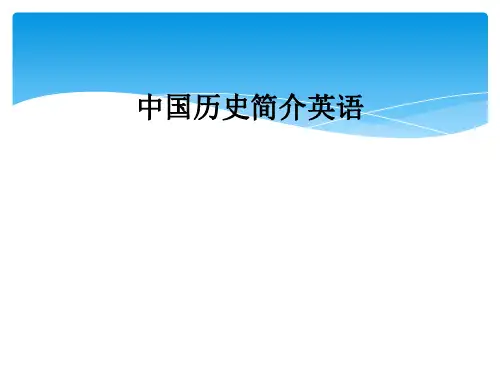
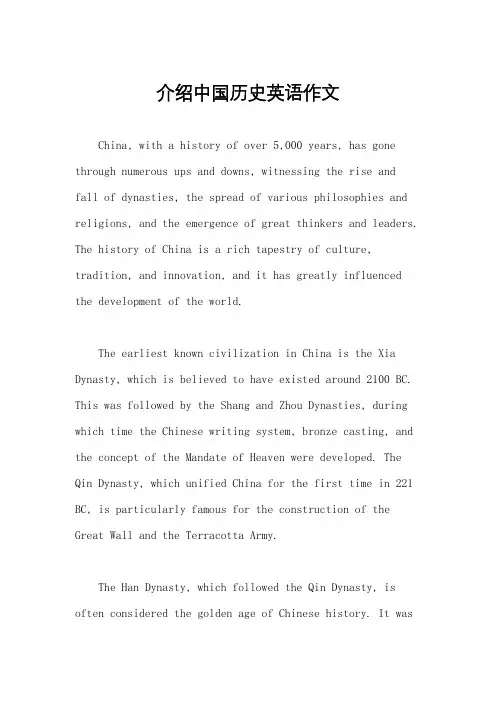
介绍中国历史英语作文China, with a history of over 5,000 years, has gone through numerous ups and downs, witnessing the rise andfall of dynasties, the spread of various philosophies and religions, and the emergence of great thinkers and leaders. The history of China is a rich tapestry of culture, tradition, and innovation, and it has greatly influenced the development of the world.The earliest known civilization in China is the Xia Dynasty, which is believed to have existed around 2100 BC. This was followed by the Shang and Zhou Dynasties, during which time the Chinese writing system, bronze casting, and the concept of the Mandate of Heaven were developed. The Qin Dynasty, which unified China for the first time in 221 BC, is particularly famous for the construction of the Great Wall and the Terracotta Army.The Han Dynasty, which followed the Qin Dynasty, is often considered the golden age of Chinese history. It wasduring this time that Confucianism became the officialstate philosophy and the Silk Road was established, leading to the exchange of goods, ideas, and cultures between China and the rest of the world. The Tang and Song Dynasties that followed were also periods of great prosperity and cultural achievement, with advancements in art, literature, and technology.The Yuan Dynasty, established by the Mongols under the leadership of Kublai Khan, marked a significant period of foreign rule in China. However, it was during this timethat Marco Polo visited China and wrote about its wonders, sparking the interest of the Western world in the Middle Kingdom. The Ming Dynasty, which overthrew the Mongol rule, is known for its maritime expeditions led by the famous explorer Zheng He, as well as the construction of the Forbidden City in Beijing.The Qing Dynasty, which was established by the Manchus, was the last imperial dynasty of China. During this time, China experienced both internal rebellions and external invasions, leading to the decline of imperial power. In1911, the Qing Dynasty was overthrown, and the Republic of China was established, marking the end of over 2,000 years of imperial rule.The 20th century saw the rise of the Communist Party of China, led by Mao Zedong, and the founding of the People's Republic of China in 1949. Under the leadership of the Communist Party, China underwent significant social, economic, and political reforms, including the Great Leap Forward and the Cultural Revolution. In the late 20th century, China opened up to the world and embraced market-oriented economic policies, leading to rapid industrialization and modernization.Today, China is a global superpower with a richcultural heritage and a rapidly growing economy. Itshistory has shaped its identity as a nation, and its influence can be seen in various aspects of global culture, from cuisine and language to philosophy and art. As China continues to play a prominent role on the world stage, its history remains a source of pride and inspiration for its people.。
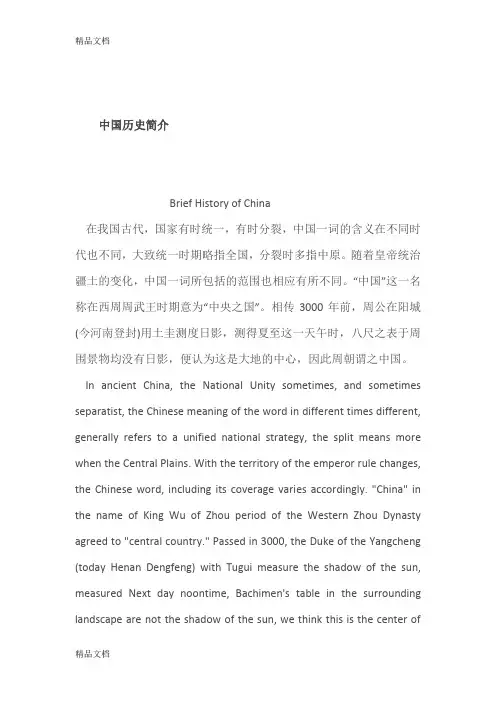
中国历史简介Brief History of China在我国古代,国家有时统一,有时分裂,中国一词的含义在不同时代也不同,大致统一时期略指全国,分裂时多指中原。
随着皇帝统治疆土的变化,中国一词所包括的范围也相应有所不同。
“中国”这一名称在西周周武王时期意为“中央之国”。
相传3000年前,周公在阳城(今河南登封)用土圭测度日影,测得夏至这一天午时,八尺之表于周围景物均没有日影,便认为这是大地的中心,因此周朝谓之中国。
In ancient China, the National Unity sometimes, and sometimes separatist, the Chinese meaning of the word in different times different, generally refers to a unified national strategy, the split means more when the Central Plains. With the territory of the emperor rule changes, the Chinese word, including its coverage varies accordingly. "China" in the name of King Wu of Zhou period of the Western Zhou Dynasty agreed to "central country." Passed in 3000, the Duke of the Yangcheng (today Henan Dengfeng) with Tugui measure the shadow of the sun, measured Next day noontime, Bachimen's table in the surrounding landscape are not the shadow of the sun, we think this is the center ofthe earth, so that goes to China.汉朝以后,虽然有些外族入侵中原后建立的政权也自称“中国”,但是并不代表它们就是中国政权。

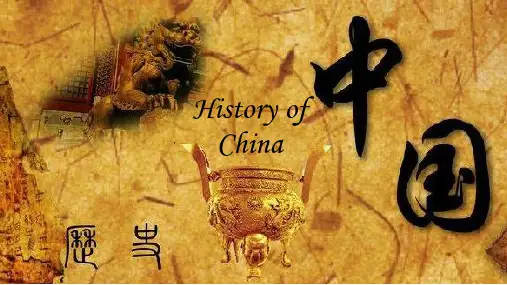
介绍中国上下五千年的英语作文China, with its rich history spanning over five thousand years, is a land steeped in tradition and filled with stories of ancient civilizations. From the mythical times of the Yellow Emperor to the modern era of rapid development, China has witnessed numerous transformative events that have shaped its culture and influenced the global stage.中国凭借其悠久的历史超过五千年,是一个充满传统并充斥着古老文明故事的国度。
从黄帝的神话时代到现代快速发展的时代,中国见证了许多具有深远影响的事件,这些事件塑造了中国文化,并对全球产生了影响。
Ancient China, during the dynastic rule, saw the rise and fall of various empires such as the Xia, Shang, Zhou, Qin, Han, Tang, Song, Ming, and Qing dynasties. Each dynasty left its mark on Chinese history through advancements in governance structures, philosophical ideologies, technological innovations, and artistic achievements.古代中国,在朝代统治下,经历了夏、商、周、秦、汉、唐、宋、明和清朝等各个帝国的兴衰。
中国历史介绍英文China's Captivating History: A Timeless JourneyChina, a land steeped in ancient traditions and a rich cultural heritage, has long been a source of fascination for the world. From the grandeur of the Forbidden City to the serene beauty of the Yangtze River, the country's history is a tapestry woven with tales of dynasties, technological advancements, and the resilience of its people. In this comprehensive exploration, we delve into the captivating narrative that has shaped the Middle Kingdom, revealing the pivotal moments that have molded its enduring legacy.The origins of Chinese civilization can be traced back to the Xia Dynasty, the first recorded dynasty in Chinese history, which flourished during the 21st to 16th centuries BCE. This early period laid the foundation for the development of a sophisticated societal structure, with the emergence of a centralized government, the cultivation of advanced agricultural techniques, and the establishment of a writing system that would become the foundation for the Chinese language. The subsequent Shang Dynasty, from the 16th to 11th centuries BCE, further solidified the country's political and cultural identity, introducing the use of bronze and the conceptof the Mandate of Heaven, which would shape the dynastic succession for centuries to come.The rise of the Zhou Dynasty, from the 11th to 3rd centuries BCE, marked a significant turning point in Chinese history. This era witnessed the flourishing of Confucianism, a philosophical system that would become deeply ingrained in the fabric of Chinese society, emphasizing the importance of social harmony, filial piety, and the role of the individual within the larger societal structure. The Zhou Dynasty also saw the emergence of the Warring States period, a tumultuous era of political fragmentation and military conflict that ultimately paved the way for the unification of China under the Qin Dynasty in 221 BCE.The Qin Dynasty, though relatively short-lived, left an indelible mark on Chinese history. Under the rule of the first emperor, Qin Shi Huang, the country was unified, a standardized system of weights and measures was introduced, and the construction of the iconic Great Wall began. The Han Dynasty, which followed from 206 BCE to 220 CE, further solidified China's position as a global power, with the expansion of its territory, the flourishing of trade along the Silk Road, and the development of a sophisticated bureaucratic system that would serve as a model for future dynasties.The subsequent centuries witnessed the rise and fall of numerousdynasties, each leaving its unique imprint on Chinese culture and society. The Tang Dynasty, from 618 to 907 CE, is often regarded as the golden age of Chinese civilization, marked by advancements in art, literature, and the sciences. The Song Dynasty, from 960 to 1279 CE, saw the emergence of groundbreaking technological innovations, such as the compass, gunpowder, and the printing press, which would have far-reaching global implications.The Ming Dynasty, from 1368 to 1644 CE, is renowned for the construction of the Forbidden City in Beijing, as well as the voyages of the famous explorer Zheng He, who led a series of expeditions that extended China's influence across the Indian Ocean. The Qing Dynasty, the last imperial dynasty, ruled from 1644 to 1912 CE, and is remembered for its cultural and artistic achievements, as well as its eventual decline in the face of Western imperialism and the rise of nationalist movements.The 20th century marked a pivotal turning point in Chinese history, with the establishment of the People's Republic of China in 1949 under the leadership of Mao Zedong. This era witnessed significant social and economic transformations, including the implementation of communist policies, the Great Leap Forward, and the Cultural Revolution. In the decades that followed, China has undergone a remarkable transformation, emerging as a global economic powerhouse and a leading force in the international community.Throughout its long and storied history, China has demonstrated an unparalleled resilience and adaptability. From the ancient dynasties to the modern era, the country has consistently reinvented itself, embracing new ideas and technologies while preserving its rich cultural heritage. As the world continues to grapple with the challenges of the 21st century, China's enduring legacy serves as a testament to the enduring strength and ingenuity of the Chinese people, and a reminder of the enduring influence of this remarkable nation on the global stage.。
介绍中国历史英语作文China, a country with a rich tapestry of history that spans over four millennia, has been home to numerous dynasties, cultural developments, and significant historical events.This essay aims to provide a brief introduction to the vast and complex history of China.Ancient China and the Birth of CivilizationThe story of China begins with the legendary times of the Yellow Emperor and the Yan Emperor, who are said to havelived around 2700 BCE. The first historical dynasty, the Xia Dynasty, is believed to have existed around 2070 BCE to 1600 BCE, although its existence is still debated among historians. The Shang Dynasty (1600 BCE to 1046 BCE) is the first toleave behind a substantial body of evidence, including the development of the earliest known form of Chinese writing.The Imperial Era: Dynasties and ExpansionThe Zhou Dynasty (1046 BCE to 256 BCE) marked the beginningof the imperial era, which would continue until the fall ofthe Qing Dynasty in 1912. The Qin Dynasty (221 BCE to 206 BCE), under the leadership of Emperor Qin Shi Huang, unified China and standardized various systems, including the famous Terracotta Army. The subsequent Han Dynasty (206 BCE to 220 CE) expanded China's territory and saw the Silk Road's establishment, facilitating trade and cultural exchange.The Tang (618 CE to 907 CE) and Song (960 CE to 1279 CE) Dynasties are often considered the golden ages of Chinese civilization, with significant advancements in art, science, and governance. The Ming Dynasty (1368 CE to 1644 CE) is known for the construction of the Forbidden City and the Great Wall's expansion.Modern Times: The Struggle and RebirthThe fall of the Ming Dynasty led to the establishment of the Qing Dynasty (1644 CE to 1912 CE), which saw the end of the imperial system with the Xinhai Revolution. The 20th century was marked by the Chinese Civil War, the Second Sino-Japanese War, and the rise of the People's Republic of China in 1949 under the leadership of Mao Zedong.Contemporary China: Reform and Global InfluenceSince the late 1970s, China has undergone significant economic reforms under the leadership of Deng Xiaoping, transforming it into a global economic powerhouse. The country's history continues to influence its politics, culture, and international relations, with a focus on both preserving its ancient traditions and embracing modern global integration.ConclusionChina's history is a fascinating blend of ancient traditions and modern achievements. From the dynastic rule to thecultural and technological advancements, the story of Chinais one of resilience, innovation, and a continuous quest for progress. As the world's most populous country, China's past continues to shape its present and future, offeringinvaluable lessons and insights for the global community.This essay has merely scratched the surface of China's extensive history. For those interested in delving deeper,the study of Chinese history offers a wealth of knowledge and a unique perspective on the development of human civilization.。
中国历史简介Brief History of China在我国古代,国家有时统一,有时分裂,中国一词的含义在不同时代也不同,大致统一时期略指全国,分裂时多指中原。
随着皇帝统治疆土的变化,中国一词所包括的范围也相应有所不同。
“中国”这一名称在西周周武王时期意为“中央之国”。
相传3000年前,周公在阳城(今河南登封)用土圭测度日影,测得夏至这一天午时,八尺之表于周围景物均没有日影,便认为这是大地的中心,因此周朝谓之中国。
In ancient China, the National Unity sometimes, and sometimes separatist, the Chinese meaning of the word in different times different, generally refers to a unified national strategy, the split means more when the Central Plains. With the territory of the emperor rule changes, the Chinese word, including its coverage varies accordingly. "China" in the name of King Wu of Zhou period of the Western Zhou Dynasty agreed to "central country." Passed in 3000, the Duke of the Yangcheng (today Henan Dengfeng) with Tugui measure the shadow of the sun, measured Next day noontime, Bachimen's table in the surrounding landscape are not the shadow of the sun, we think this is the center of the earth, so that goes to China.汉朝以后,虽然有些外族入侵中原后建立的政权也自称“中国”,但是并不代表它们就是中国政权。
因为他们这个自称的“中国”通常指地理概念上的“中原”而不是国家意义上的“中国”。
即使历史上的某个政权自称中国政权,也未必代表它就真的是中国政权。
根据史料,日本也常常自称“华夏”、“中华”。
例如《大日本史》卷117,载奈良时代藤原广嗣在公元740年(唐代开元二十八年)上表日主:“北狄虾夷,西戎隼俗,狼性易乱,野心难驯。
往古已来,中国有圣则后服,朝堂有变则先叛”。
二战结束,日本天皇在《终战诏书》中还把日本称为“神州”,但是日本和中国显然是两国。
判断历史上一个政权是否是中国政权,主要看它与前一个中国政权的关系,是以国内政权更换的形式取代前一个中国政权,还是以外来征服者的姿态取代前一个中国政权。
After the Han Dynasty, although some alien invasion originally established by the regime are calling themselves "Chinese" But this does not mean that the Chinese regime. Because they are the self-styled "China" usually refers to a geographical concept of "heartland," rather than a national sense of "China." Even in the history of any regime claiming the Chinese regime, it does not necessarily mean it really is the Chinese regime. According to historical data, the Japanese are often called himself "China" and "China." For example, "in connection with" Volume 117, Nara era Fujiwara containing widely Nations in the year 740 (Tang Dynasty 1939), Table Main : "Beidi Yezo. Xi Rong Falcon secular and Wolf easy chaotic, difficult to tame ambitions. to have come to ancient China after the St. clothes, Zhutang change, I will rebel. " The end of World War II, the Japanese emperor in "the end of the war rescript" Japan also known as "Divine", but Japan and China is obviouslythe two. Historical judgment on whether a regime of the Chinese regime, it's important to see a China with the former regime, on the domestic regime change in the form of a place of the former Chinese regime, or outside conqueror posture to replace the former one Chinese regime.中国不是一个单纯的地理概念,更是一个民族与文化的概念。
中国是华夏汉族建立并以华夏汉族为主体的国家。
古代中国人历来就有抵抗外侵、保卫家园的光荣传统,一旦有外族入侵,便会英勇反抗,绝不允许外来入侵者篡夺中华正统的地位。
从霍去病的“匈奴未灭,何以家为”,到岳飞的“精忠报国”,每一次遭受外侵,古代中国人都奋起抵抗,无一不验证了这一光荣传统。
孔子在论语中评价管仲说:“微管仲,吾其披发左衽矣!”,意思是,有了管仲,华夏没有亡于外族。
什么叫“披发左衽”?“披发左衽”的反义词,就是“束发右衽”,也就是华夏汉族的发型服装,是华夏汉族和华夏汉文化的代表。
可见,孔子也是把华夏汉族和华夏汉文化视为中华正统,不容外族取代中华正统。
所谓的“夷狄入中国,则中国之”,这里的“夷狄入中国”指的是归化、内附中国,决不是以外来征服者的姿态征服中国。
China is not simply a geographical concept, it is a national and cultural concept. China is the establishment of China Han Han and China as the main countries. Ancient Chinese people will always resist foreign aggression, defend the homeland's glorious traditions, once the alien invasion, it would heroic resistance never allow foreign invaders usurp China orthodox position. Rock engraving of Huo Qubing "Huns notextinguished, and why the family", Yue Fei's "Total Loyalty to the country", each from a foreign invasion, Ancient Chinese people rose in resistance, all verified by this glorious tradition. The Analects of Confucius in evaluating Guan Zhong said : "Micro - Guan Zhong, I left their overlapping part of Chinese gown disheveled hair now!" , Which means that with Guan Zhong. China did not perish in the tribe. What is called the "overlapping part of Chinese gown disheveled hair left?" "Disheveled hair left overlapping part of Chinese gown" antonyms, "beams the right overlapping part of Chinese gown," which is China's Han hairstyle clothing, China is Han Chinese culture and Chinese representatives. This shows that Confucius was also put China and China Han Han Chinese culture as orthodox and not orthodox tribe replace China. The so-called "barbarians into China, then China", where the "Yellow-China" refers to the naturalization, containing China, is not a foreign conqueror gesture to conquer China.满清入关,大儒学家顾炎武提出了“亡国”与“亡天下”之辨。